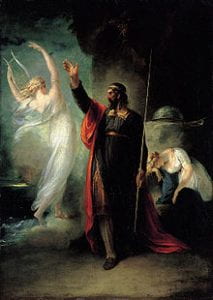Man, and nature: power and control in The Tempest
In The Tempest, there is the theme of man and the natural world. There is an overlaying idea within the play that is, can a man be at one with nature or does he make whatever touches unnatural. This is most predominantly seen through the character of Prospero and his control and interactions with other characters. In this way, the island cannot be depicted as perfect or untouched when there is the presence of magic everywhere. Magic does not fit into the course of nature and arguably can change the course of natural events.i With this being said, man through the use of magic can cause discourse in the natural world.
Boatswain is seen to question Prospero and ask him about his power over the elements. This can be seen in “if you control these elements to silence and work the peace of present, we will not hand a rope more.”ii This shows a close relationship between man and the natural world; to be able as a human being to change the weather according to one’s own desires conveys how Prospero is changing the natural course of nature. Furthermore, it conveys the heightened sense of power that Prospero has, and the way in which people look to him to take control of difficult situations. There is the constant need for man to be in control and it further shows how insatiable the drive to assume power by any means necessary is paramount not just for Prospero, but arguably man alike. From the quote, it can also be deduced that there is a natural primal instinct that we as humans have. The need and want to survive is one that lays innately within us. In this way, being fearful of the elements the king of Naples and Prospero appear to constantly seek ways in order to tame nature and command it to do what they want it to do.iii But of course, this is not the way that nature operates, and would not be called nature if it was easily able to be controlled by man.
Prospero is a central character that influences the notion that nature and anger are one entity. It is his anger and desire to control which causes many other characters to obey his every command. It is important to understand that the characters willingness to participate in Prospero’s many schemes may not solely be one of choice but also by the force of Prospero and other participants.iv It is the spells that Prospero casts over Miranda that can be seen as man changing the course of nature. If he can control her actions, then that means that he is altering her autonomy of actions, and arguably the predetermined actions that she would have otherwise carried out. In this way, Miranda becomes silenced and objectified and is used just as a pawn to ensure that her father gets everything that he planned for.v Nature is also used to represent the character of each individual. In this way, Miranda is characterised as pure and tameable, whilst Caliban is depicted as wild and raw. They appear to convey the two opposing sides of nature, and still, they are both able to be easily controlled and manipulated by Prospero. Both characters especially Miranda, are a product of the living environment that Prospero has composed for them. She has been natured to obey the commands of her father and this is also mirrored in the way that she converses with him. She replies often subserviently and obediently and also assumes the way that her father speaks, in reference to Caliban. A lot of her interactions are harsh or arguably hate driven, and one can say that she has consequently been natured by Caliban to react and behave in this way. This can be seen when she says “abhorred slave […] a thing most brutish”.vi Despite being in the same position of suppression as Caliban, she still feels it necessary to make a distinction between the two of them. She does this by elevating her status and diminishing his. In this way, she is assuming the role of her father to have the natural urge of assuming power.
To conclude, we can see in the play that is within human nature to want to govern the environment and the people within it. This sense of power is done at all measures, as long as the final result is going to be one that is beneficial to the individual. Prospero takes power into his own hands and uses magic to manipulate and coerce changes not only in the elements but in the subjects around him including his own daughter. By manipulating the weather, Prospero is able to assume respect, hope as well as an element of fear from the people around him. Furthermore, the weather can be seen to be a reflection of his character and his quick temper. He is constantly seeking control over the weather, and arguably his emotions also.
Bibliography
Corfield, Cosmo, “Why Does Prospero Abjure His “Rough Magic”?”, Shakespeare Quarterly, 36 (1985)
D’Amico, Jack, Knowledge And Power In The Renaissance (University Press of America, 1977)
Dassonville, Lena, The Hegemonic System Of Production. How Shakespeare And History Commodify And Confine The Feminine (GRIN Verlag, 2016)
Mowat, Barbara A, and Paul Werstine, The Tempest (Simon and Schuster, 2015)
Phillips, James E, “The Tempest And The Renaissance Idea Of Man”, Shakespeare Quarterly, 15 (1964)

